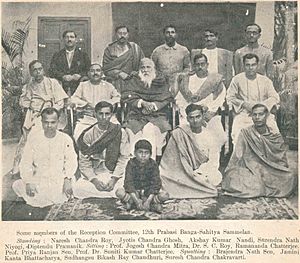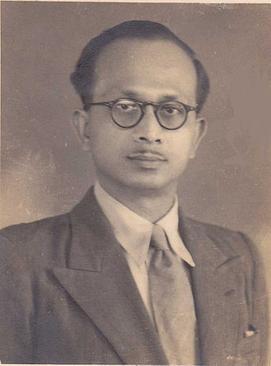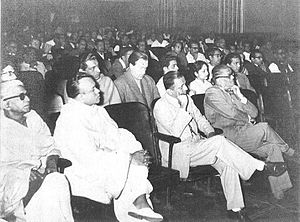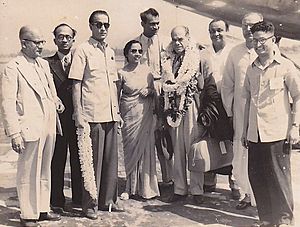Diptendu Pramanick facts for kids
Quick facts for kids
Diptendu Pramanick
|
|
|---|---|
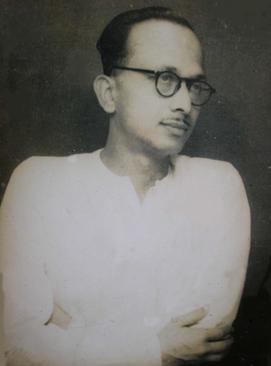 |
|
| Born | July 18, 1910 |
| Died | December 15, 1989 (aged 79) |
| Nationality | Indian |
| Years active | 1931-1976 |
| Children | Subrata Pramanick & Eva Kundu |
| Parent(s) | Swarnabala & Sudhamoy Pramanick |
Diptendu Pramanick (born July 18, 1910 – died December 15, 1989) was a very important person in the Bengali film world from Calcutta. He helped start the Eastern India Motion Pictures Association in Calcutta, India. This group connects people in the film industry in eastern India with the government. During his long career, he met many famous people. He also saw this organization grow from a small group to a big one covering a wide area.
Contents
Early Life and School
Diptendu Pramanick was born on July 18, 1910, in Calcutta. He was the oldest son of Sudhamoy Pramanick from Shantipur. He went to school in Calcutta first. Later, he studied at Raiganj Coronation School in Raiganj. His father was a lawyer there.
In 1926, he came back to Calcutta. He passed his high school exams and then his science exams in 1928. After that, he joined Scottish Church College, Calcutta.
His father was involved with the Congress and the Satyagraha movement. This meant Diptendu met many people who wanted change. He was also inspired by Subhas Chandra Bose. Bose had stood up to a teacher who spoke badly about Indians. Diptendu also challenged a teacher at Scottish Church College who disliked Indians.
He later went to Asutosh College, Calcutta. In 1931, he earned a science degree from the University of Calcutta.
His Work in Films
Starting Out (1931-1948)
After college, Diptendu Pramanick worked as a secretary for the Mayor of Calcutta, Sri Santosh Kumar Basu. He loved books and writing. So, he joined many literary groups and conferences about Bengali literature. He was part of the committee for the 12th Nikhil Bharat Banga Sahitya Sammelan in Calcutta in December 1934. The famous poet Rabindranath Tagore opened this event.
After the Mayor's term ended, Diptendu worked in Civil Defense. He was a Liaison Officer in the Publicity Section of the Commercial Museum. In 1942, he moved to the Home Department of the Bengal Government. He continued his work in Civil Defense there. Civil Defense was started during World War II (1939–1945). Its job was to protect people and property. It also trained citizens for wartime problems.
During this time, Japan had taken over Burma. People in Calcutta worried about bombings. Japanese planes eventually bombed Budge Budge, south of Calcutta. A Bengali folk rhyme talks about this event:
| Sa-re-ga-ma-pa-dha-ni | [Do re me fa so la ti] |
| Bom(b) phelechhe Japani, | the Japanese have dropped a bomb |
| Bomer modhye keute shap | There is a cobra in the bombs |
| British bole bapre-bap. | The British shout, (in awe and fear) |
This bombing caused a lot of fear. Over a million people left the city. City leaders had to work hard to control the situation. The Indian Civil Defence Department grew quickly to handle these threats. They planned things like dimming lights, medical teams, and fire-fighting units. After the war ended in 1947, the department slowly closed down.
Later, Diptendu tried starting his own business called Cine Furnishers Limited with some friends. This is where he met many people from the Bengali film industry in Kolkata.
Leading the Film Industry (EIMPA)
Because of his new contacts, Diptendu joined the Bengal Motion Pictures Association (BMPA) in 1948. This group was for film producers, distributors, and cinema owners in Bengal. He became its Secretary, and B. N. Sircar was the President. The next year, he started the BMPA journal and was its editor for over twenty years.
The Association first worked from a rented place. But under Diptendu's leadership, it grew. It moved to a new, bigger building at 98E Chowringhee Square. This is now called 98E B.N. Sircar Sarani, also known as EIMPA house.
Diptendu was the first secretary of the expanded Eastern India Motion Picture Association (EIMPA). He helped open EIMPA offices in Patna and Guwahati. During the war, it was hard to get enough film stock (the raw film used to make movies). The Government of India created a Film Advisory Committee. This committee controlled how raw film was given out. EIMPA played a key role in getting materials for the film industry in eastern India. Diptendu worked hard on this.
He also served as the Secretary of the Film Federation of India from 1953 to 1954. In 1956, Diptendu and other important people like Satyajit Ray helped restart the Calcutta Film Society. About 300 people joined it.
This same group then helped create the Federation of Film Societies of India (FFSI) in 1959. Satyajit Ray was the president, and Diptendu was the Joint Treasurer. Indira Gandhi was also a member of the FFSI until 1964.
First International Film Festival of India (IFFI), 1952
The Films Division of the Government of India organized the First International Film Festival of India in 1952. BMPA played a big part in holding the festival in Calcutta. Frank Capra, a famous American film director, came to Calcutta. He was very happy with the welcome he received. He had visited Bombay and Delhi before.
In his book, he wrote:
.. Was deluged with garlands ... Bengali people are quite different from the rest of India. They are like the Irish, emotional, sentimental. All riots and revolutions start in Bengal. I can understand it. It took me an hour to leave the airport, what with the crowds and the photographers...
The picture shows his welcome at the Dum Dum Airport. Many important people from the Calcutta film world were there.
First Film Seminar, 1955
The Sangeet Natak Akademi held the first film seminar in Delhi. Prime Minister Pandit Jawaharlal Nehru opened it. Many important film personalities attended this seminar.
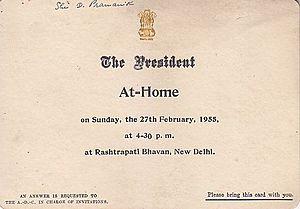
Invitation to meet the President, Dr Rajendra Prasad, at his home.
|
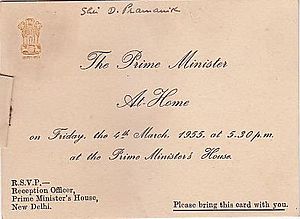
Invitation from the Prime Minister, Pandit Nehru, to meet at his home.
|
Later Years
In the early 1970s, Diptendu Pramanick was still asked to join important committees. He represented the film industry on issues about its structure and laws. This included the important 1967-68 and 1973-74 Parliamentary Estimates Committee.
These committees wrote detailed reports. They talked about how films could get money and how states could fund cinema. They also suggested creating new "low-budget" stars. This would help balance the film industry, which relied too much on a few big stars. They also suggested changes to film censorship. In a way, these reports predicted the rise of new stars from the state-run FTII, like Naseeruddin Shah and Smita Patil.
The Pramanick Family
| Gobindo Chandra | Radharani | ||||||||||||||||||||||||||||||||||||||||||||||||||||||||||||||||||||||||||
| Sudhamoy Pramanick | Swarnabala | ||||||||||||||||||||||||||||||||||||||||||||||||||||||||||||||||||||||||||
| Diptendu Pramanick | Niyoti | Nabendu | Suprabha | Subhendu | Anita | Sabita | Nikhilendu | Asita ... | |||||||||||||||||||||||||||||||||||||||||||||||||||||||||||||||||||
| Subrata | Gouri | ||||||||||||||||||||||||||||||||||||||||||||||||||||||||||||||||||||||||||
| Sougata Pramanick | Aditi | ||||||||||||||||||||||||||||||||||||||||||||||||||||||||||||||||||||||||||
| Sharmila | Oindrila | ||||||||||||||||||||||||||||||||||||||||||||||||||||||||||||||||||||||||||
Legacy
Every year, children from poor families in Dahuka, a small village in Bardhaman district, receive school books. This happens through the Diptendu Pramanick Book fund. The books are given out during a ceremony for Saraswati Puja.
The main group for film distributors and producers, EIMPA, still helps the film industry today. It faces new challenges like big companies taking over, censorship, illegal copying of films, and the rise of "multiplex" cinemas.


